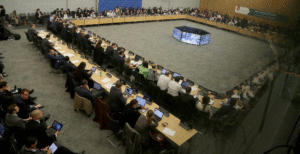
An inter-governmental body, the Financial Action Task Force (FATF) in its Paris Plenary has confirm placing Pakistan in the grey list for inaction against terror funding.
- At the Paris meeting, FATF has laid out a 10-point action plan for compliance with its guidelines. If Pakistan fails to implement the said guidelines, it may result in it being included in the black list the next year.
- However this is not first time Pakistan has been placed in the grey list. This is the second time it has been grey-listed and is facing sanctions.
- Pakistan has been instructed to take actions against Hafiz Saeed and Masood Azhar, Taliban and Haqqani Network, Jaish-e-Mohammad, Lashkar-e-Taiba, and their affiliates. These actions include depriving of their resources and sources of funding.
- Pakistan will have to take steps
- To ensure that terror funding risks are properly identified, assessed and that supervision is applied on a risk-sensitive basis.
- To show that remedial measures are being taken to prevent financial institutions from indulging in money laundering and terror funding.
- To take stringent action against illegal financial operations, identify cash couriers and enforce controls on illicit movement of currency.
- To improve coordination between the provincial and federal authorities on combating terror funding and enforce effective prosecution and conviction of the designated persons, entities and their affiliates.
The Financial Action Task Force (FATF)
- The Financial Action Task Force (FATF) is an inter-governmental body established in 1989 by the Ministers of its Member jurisdictions.
- The objectives of the 37 member (35 countries and 2 regional organisations) FATF are to set standards and promote effective implementation of legal, regulatory and operational measures for combating money laundering, terrorist financing and other related threats to the integrity of the international financial system.
- The FATF is therefore a “policy-making body” which works to generate the necessary political will to bring about national legislative and regulatory reforms in these areas.
- India is a member of the FATF since 2010.
- The FATF has developed a series of recommendations that are recognised as the international standard for combating of money laundering and the financing of terrorism and proliferation of weapons of mass destruction. They form the basis for a co-ordinated response to these threats to the integrity of the financial system and help ensure a level playing field.
- First issued in 1990, the FATF Recommendations were revised in 1996, 2001, 2003 and most recently in 2012 to ensure that they remain up to date and relevant, and they are intended to be of universal application.
- The FATF’s decision making body, the FATF Plenary, meets three times per year.

